BusinessEurope Headlines No. 2016-39
Harnessing globalisation through trade
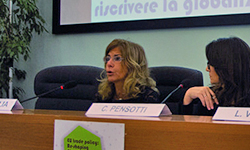 “When talking about trade and globalisation, we witness two opposite but coexisting trends: an increasing opposition to trade agreements, seen as one evil together with globalisation, and, at the same time, requests to include in trade agreements elements that are not core trade policy”, said Emma Marcegaglia, President of BusinessEurope, speaking at the event “EU Trade policy: reshaping globalisation” organised on 18 November by MEP Alessia Mosca in Milan, Italy. Speaking in presence of European Commissioner Cecilia Malmström, Italian Minister Carlo Calenda and ETUC Secretary General Luca Visentini, President Marcegaglia added that “There is a need to raise awareness and manage expectations by explaining what benefits can reasonably be achieved through international trade and preparing the ground to ensure greater portions of society can yield the benefits coming from trade”.
“When talking about trade and globalisation, we witness two opposite but coexisting trends: an increasing opposition to trade agreements, seen as one evil together with globalisation, and, at the same time, requests to include in trade agreements elements that are not core trade policy”, said Emma Marcegaglia, President of BusinessEurope, speaking at the event “EU Trade policy: reshaping globalisation” organised on 18 November by MEP Alessia Mosca in Milan, Italy. Speaking in presence of European Commissioner Cecilia Malmström, Italian Minister Carlo Calenda and ETUC Secretary General Luca Visentini, President Marcegaglia added that “There is a need to raise awareness and manage expectations by explaining what benefits can reasonably be achieved through international trade and preparing the ground to ensure greater portions of society can yield the benefits coming from trade”.
Contact: Eleonora Catella
Markus J. Beyrer comments on Winter Energy Package
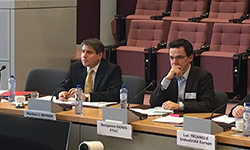 Ahead of the publication of the European Commission’s Winter Package, BusinessEurope Director General Markus J. Beyrer said: “We welcome the Commission's efforts to reform the power market, adapting it to reality and addressing the issue of declining investments. The ongoing transformation seems more profound and difficult than envisaged. But a coherent approach of the Energy Union is a must. That also means we need more Europe and less distortive national interventions!” He addressed the Commission’s Vice-President Maroš Šefčovič in a joint meeting with social partners on 21 November. Representatives of employers and employees had a possibility to comment on the state of the Energy Union and the upcoming Winter Energy Package. Beyrer warned of potential overlaps of different policy instruments. He called on the Commission for a realistic approach to cost-effectiveness that would maintain the indicative 27% energy efficiency target, as agreed by the heads of states and governments in 2014. He concluded stressing the need to address the surging energy prices, due to policy costs and taxes, with direct impact on the European competitiveness.
Ahead of the publication of the European Commission’s Winter Package, BusinessEurope Director General Markus J. Beyrer said: “We welcome the Commission's efforts to reform the power market, adapting it to reality and addressing the issue of declining investments. The ongoing transformation seems more profound and difficult than envisaged. But a coherent approach of the Energy Union is a must. That also means we need more Europe and less distortive national interventions!” He addressed the Commission’s Vice-President Maroš Šefčovič in a joint meeting with social partners on 21 November. Representatives of employers and employees had a possibility to comment on the state of the Energy Union and the upcoming Winter Energy Package. Beyrer warned of potential overlaps of different policy instruments. He called on the Commission for a realistic approach to cost-effectiveness that would maintain the indicative 27% energy efficiency target, as agreed by the heads of states and governments in 2014. He concluded stressing the need to address the surging energy prices, due to policy costs and taxes, with direct impact on the European competitiveness.
Contact: Jan Bambas
European employers preparing for the 4th industrial revolution
 “Digital, the 4th Industrial Revolution seemingly knows no boundaries. Digital offers endless possibilities for European industry. Not only will digital make industries become more efficient but it will transform them entirely,” said Markus J. Beyrer, BusinessEurope Director General, at The Digital (R)evolution event in Zagreb, Tuesday 22 November. The level of development of the digital society as a prerequisite for a stronger development, application and adoption of new business was discussed in a panel discussion with more than 450 entrepreneurs and employers, but also the Croatian Deputy Prime Minister and Minister of small and medium enterprises and trade Martine Dalić.
“Digital, the 4th Industrial Revolution seemingly knows no boundaries. Digital offers endless possibilities for European industry. Not only will digital make industries become more efficient but it will transform them entirely,” said Markus J. Beyrer, BusinessEurope Director General, at The Digital (R)evolution event in Zagreb, Tuesday 22 November. The level of development of the digital society as a prerequisite for a stronger development, application and adoption of new business was discussed in a panel discussion with more than 450 entrepreneurs and employers, but also the Croatian Deputy Prime Minister and Minister of small and medium enterprises and trade Martine Dalić.
Contact: Guido Lobrano or Patrick Grant
Educating for employment and citizenship
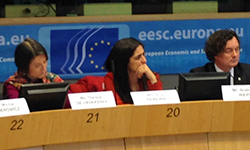 Educating for citizenship is part of the basic competences that employers need, but educating for employment is central, if we want to educate for citizenship. To empower individuals, education has to be more and more about teaching people to ask themselves the right questions and then find the answers by themselves. Science, technology, engineering, mathematics (STEM) education is increasingly important. STEM education should start at primary school and continue through to tertiary education and adult learning. Apprenticeship is key because training that takes place in a real workplace is the best way to make sure that people are equipped with the skills that companies need and it is also cost- effective as equipping schools and training centres with state of the art technology can be very expensive. These were the key messages given by Thérèse de Liedekerke, Deputy Director General, during the New Education Forum on 17 November, which took place under the honorary patronage of BusinessEurope. STEM skills are particularly important for a broad-based approach to the acquisition, development and application of digital skills, which are increasingly vital in different working environments and a key asset for the productivity and competitiveness of companies.
Educating for citizenship is part of the basic competences that employers need, but educating for employment is central, if we want to educate for citizenship. To empower individuals, education has to be more and more about teaching people to ask themselves the right questions and then find the answers by themselves. Science, technology, engineering, mathematics (STEM) education is increasingly important. STEM education should start at primary school and continue through to tertiary education and adult learning. Apprenticeship is key because training that takes place in a real workplace is the best way to make sure that people are equipped with the skills that companies need and it is also cost- effective as equipping schools and training centres with state of the art technology can be very expensive. These were the key messages given by Thérèse de Liedekerke, Deputy Director General, during the New Education Forum on 17 November, which took place under the honorary patronage of BusinessEurope. STEM skills are particularly important for a broad-based approach to the acquisition, development and application of digital skills, which are increasingly vital in different working environments and a key asset for the productivity and competitiveness of companies.
Contact: Robert Plummer
Foreign Economic Diplomacy and Development - the role of business
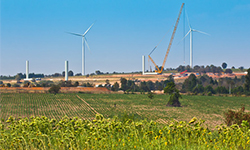 Talking about development and investment in the event “EU Economic Diplomacy: towards a strategic approach?” organised by the European Policy Centre (EPC), BusinessEurope stressed that companies can have a positive and transformative role when they trade and invest abroad. European business is more and more involved in initiatives that do not only pursue economic objectives but intend also to promote social and economic development of local communities, enhance environmental standards and improve heath and living standards being in countries of Asia or in our neighbourhood. But business cannot replace governments, and companies need the necessary conditions to develop their activities in a stable, transparent and predictable way. These conditions can only be met if both the EU and Third Countries’ authorities work together towards creating a conducive legal framework that promotes sustainable growth. Companies are willing to do their share and commit to development projects that also have an economic rationale, but their efforts need to go hand-in-hand with political support.
Talking about development and investment in the event “EU Economic Diplomacy: towards a strategic approach?” organised by the European Policy Centre (EPC), BusinessEurope stressed that companies can have a positive and transformative role when they trade and invest abroad. European business is more and more involved in initiatives that do not only pursue economic objectives but intend also to promote social and economic development of local communities, enhance environmental standards and improve heath and living standards being in countries of Asia or in our neighbourhood. But business cannot replace governments, and companies need the necessary conditions to develop their activities in a stable, transparent and predictable way. These conditions can only be met if both the EU and Third Countries’ authorities work together towards creating a conducive legal framework that promotes sustainable growth. Companies are willing to do their share and commit to development projects that also have an economic rationale, but their efforts need to go hand-in-hand with political support.
Contact: Luisa Santos
Why CETA matters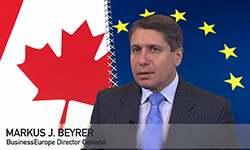
CETA will bring large opportunities to innovative and traditional SMEs of different sectors, for instance textiles and food.
![]() Contact: Luisa Santos
Contact: Luisa Santos
Circular economy discussions in Beijing
 China and the EU are pioneers in developing circular economy policies to promote the sustainable use of natural resources. Due to the large trade flow between the two regions, there is a number of areas where mutual learning could promote circularity within the regions and beyond. BusinessEurope’s Director for Industrial Affairs Alexandre Affre discussed this in a three-day mission to Beijing that was led by the EU Commissioner for the Environment Karmenu Vella and Director General Calleja Crespo. Together with a number of EU companies and business representatives, Affre discussed the key role played by industry in developing new technologies and business models. Both in China and in the EU, industry expects authorities to shape circular economy policies that are fit-for-purpose.
China and the EU are pioneers in developing circular economy policies to promote the sustainable use of natural resources. Due to the large trade flow between the two regions, there is a number of areas where mutual learning could promote circularity within the regions and beyond. BusinessEurope’s Director for Industrial Affairs Alexandre Affre discussed this in a three-day mission to Beijing that was led by the EU Commissioner for the Environment Karmenu Vella and Director General Calleja Crespo. Together with a number of EU companies and business representatives, Affre discussed the key role played by industry in developing new technologies and business models. Both in China and in the EU, industry expects authorities to shape circular economy policies that are fit-for-purpose.
Contact: Alexandre Affre
Key Economic Challenges for Europe
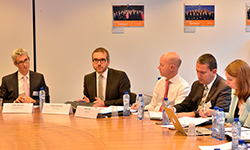 “Whilst the European economy is gradually recovering, the long-term growth potential of the EU remains around half that of the US. As we set out in our Annual Reform Barometer, much greater efforts are required to raise long-term growth through implementing structural reforms in many member states to improve the business environment, encourage labour market participation and hiring, lower energy costs and reduce taxation,” said BusinessEurope’s Director for Economics James Watson during a European Commission SME stakeholder event on 16 November. He added: “At EU level, completing the Single Market, particularly in services and in capital markets as well as strengthening and deepening Economic and Monetary Union can significantly increase growth and employment.”
“Whilst the European economy is gradually recovering, the long-term growth potential of the EU remains around half that of the US. As we set out in our Annual Reform Barometer, much greater efforts are required to raise long-term growth through implementing structural reforms in many member states to improve the business environment, encourage labour market participation and hiring, lower energy costs and reduce taxation,” said BusinessEurope’s Director for Economics James Watson during a European Commission SME stakeholder event on 16 November. He added: “At EU level, completing the Single Market, particularly in services and in capital markets as well as strengthening and deepening Economic and Monetary Union can significantly increase growth and employment.”
![]() Contact: Frederik Lange
Contact: Frederik Lange
EU package to support the scaling up of high-growth SMEs
 BusinessEurope strongly supports the deployment of a new European Venture Capital Fund of Funds to facilitate the expansion of high-growth SMEs, which is one of the measures presented in the European Commission “Start-up and Scale-up Initiative” adopted on 22 November. “This Fund of Funds will combine resources of the EU and the European Investment Bank with private funds and management expertise and will provide more venture capital to high-growth SMEs. These companies are a key asset for Europe’s return to growth,” commented Director General Markus J. Beyrer. BusinessEurope also welcomes the Commission’s move to strengthen the cross-border collaboration between platforms bringing SMEs closer to technology expertise, business opportunities and finance. The package should go hand in hand with a swifter implementation of the overall EU Single Market strategy. “At the same time, it is vital for our five million SMEs doing cross border trade that we don’t adopt ill-designed EU regulation on geo-blocking. This would put companies’ customer relations at risk,” added Markus J. Beyrer.
BusinessEurope strongly supports the deployment of a new European Venture Capital Fund of Funds to facilitate the expansion of high-growth SMEs, which is one of the measures presented in the European Commission “Start-up and Scale-up Initiative” adopted on 22 November. “This Fund of Funds will combine resources of the EU and the European Investment Bank with private funds and management expertise and will provide more venture capital to high-growth SMEs. These companies are a key asset for Europe’s return to growth,” commented Director General Markus J. Beyrer. BusinessEurope also welcomes the Commission’s move to strengthen the cross-border collaboration between platforms bringing SMEs closer to technology expertise, business opportunities and finance. The package should go hand in hand with a swifter implementation of the overall EU Single Market strategy. “At the same time, it is vital for our five million SMEs doing cross border trade that we don’t adopt ill-designed EU regulation on geo-blocking. This would put companies’ customer relations at risk,” added Markus J. Beyrer.
![]() Contact: Daniel Cloquet
Contact: Daniel Cloquet
Unlocking the potential of European business in Taiwan
 "There is an enormous amount of untapped potential for European business in Taiwan", Bernd Barkey, Chairman of the European Chamber of Commerce in Taiwan (ECCT), said in his presentation to the members of BusinessEurope. "In order to unlock this potential, however, the Taiwanese government will have to do more to recognise European certificates and international standards, address non-tariff barriers and shorten the approval process for new products", he continued. Taiwan is the EU's 7th largest trading partner in Asia, while the EU is Taiwan's 4th largest. The ECCT is confident that in 2017 the new Taiwanese government will have articulated its priorities and get down to business. BusinessEurope's Director for International Relations Luisa Santos concluded: "It is important that the Taiwanese government lays the groundwork and is well prepared for a possible launch of investment negotiations with the EU."
"There is an enormous amount of untapped potential for European business in Taiwan", Bernd Barkey, Chairman of the European Chamber of Commerce in Taiwan (ECCT), said in his presentation to the members of BusinessEurope. "In order to unlock this potential, however, the Taiwanese government will have to do more to recognise European certificates and international standards, address non-tariff barriers and shorten the approval process for new products", he continued. Taiwan is the EU's 7th largest trading partner in Asia, while the EU is Taiwan's 4th largest. The ECCT is confident that in 2017 the new Taiwanese government will have articulated its priorities and get down to business. BusinessEurope's Director for International Relations Luisa Santos concluded: "It is important that the Taiwanese government lays the groundwork and is well prepared for a possible launch of investment negotiations with the EU."
Contact: Maurice Fermont
Calendar
 28 November 2016: Investment Plan for Europe: Are we there yet?, Brussels
28 November 2016: Investment Plan for Europe: Are we there yet?, Brussels- 28-29 November 2016: Competitiveness Council
- 4 December 2016: Italian constitutional referendum
- 4 December 2016: Austrian presidential election